When Davidson Cole announced his talent in 2002 with his feature debut Design, the film world took notice. The AV Club said his leading man turn had, “…Nicolas Cage-like volatility, (making) for a compelling, put-upon hero”; Variety called his direction, “…comparable to the David Lynch of Blue Velvet”. Thirteen years later, his multi-faceted talents utilised in fields such as video game design, short documentary and experimental filmmaking and fiction writing, the LA-based auteur brings audiences Hollywood, his slightly screwy, darkly-shaded, wildly engaging sophomore effort. Ahead of the international premiere of Hollywood at the Revelation Perth International Film Festival, Cole spoke at length with SCREEN-SPACE about the passion it takes to stay committed to your vision, the origins of his latest narrative and the dark, funny love letter to film lore his new work represents…

You’ve a very eclectic film resume, from the documentary The 95th to Design and now Hollywood. Who are the artists and filmmakers that have inspired your creativity?
The movie that inspired me to make films was Raiders of the Lost Ark. I have no desire to ever make a movie like it, but the summer it was released, I must have seen it 20 times. I even knew the inflections of the dialogue by heart. This past year, my favorite film was Godard's Goodbye To Language. His work has always been a touchstone for me. Love Lynch, Altman and Cronenberg. I try to watch American Movie at least once a year, my favorite film about making movies. Sam Shepard's dialogue, especially how he navigates a monolog. Dogs inspire me too. Big fan of dogs.
 Hollywood represents the type of adventurous but assured work audiences rarely get to see in this era of ‘palatable product.’ Was the determination to film Hollywood on your terms part of the reason it has been over a decade since Design, which Variety called, “a most auspicious narrative debut,” citing your “fascinatingly complex screenplay and bold direction”?
Hollywood represents the type of adventurous but assured work audiences rarely get to see in this era of ‘palatable product.’ Was the determination to film Hollywood on your terms part of the reason it has been over a decade since Design, which Variety called, “a most auspicious narrative debut,” citing your “fascinatingly complex screenplay and bold direction”?
Following the Sundance premiere of Design, I planned on shooting Angels, this twisted, low sci-fi take on the after life; an ambitious project, tried for years to put it together, with actors attaching then moving on when we couldn't wrangle all the financing. It was frustrating. It can be a time-sink to remain too hopeful on a project getting financed at the expense of creating. The last couple years I've become more focused on what is possible with the resources at my disposal, shooting shorts or micro-budget features. I'm much happier with the prospect of shooting 3 to 4 films for next to nothing, than running around for 3 to 4 years trying to finance something for millions. That being said, I never stop trying to develop big ideas. Before we decided to make Hollywood we were tossing around this psycho-sexual nightmare titled Bathyal; insanely ambitious at the micro-budget level, but doable. After script reads and discussions with my producers Sam (Zuckerman) and Tom (Bailey) (pictured, above; on-set, with the director) and my cinematographer Dominique Martinez, Hollywood emerged as the film within reach, the one with the fiercest hold on my imagination at the time.
How did you pitch the look and decidedly offbeat narrative of Hollywood to potential investors?
I always make it clear to investors that I don't plan on playing it safe as a director but the discussion starts with the script. The narrative flourishes and visual style are rarely apparent for me at that stage. That develops, throughout the process, so I let the script and my past work be the pitch.
 The heightened reality of Hollywood is brought to vivid life by some extraordinary characters. How much of ‘Dave’, ‘Champagne’, ‘Brad Pitt’ and ‘Mary Elizabeth’ was on the page, and how much came alive in rehearsal and on-set?
The heightened reality of Hollywood is brought to vivid life by some extraordinary characters. How much of ‘Dave’, ‘Champagne’, ‘Brad Pitt’ and ‘Mary Elizabeth’ was on the page, and how much came alive in rehearsal and on-set?
I don't rehearse with my actors. I enjoy the danger of discovery on-set. I convey my own impressions of a character beforehand with a meeting or two, then rely on the actor to bring their own inner life, make their own choices, adjusting quickly on-set if need be. It seems counter-intuitive, on a micro-budget project, where time is so precious, but it works for me and keeps the cast and crew vibrant and focused on set, and when a moment really hits, is genuine, everyone knows it and that is contagious. (pictured, right; Michael Serrato as 'Brad Pitt', left, and William Belli as 'Champagne').
As important as the eccentric, larger-than-life cast is, the need for two central perfs that ground the film is even more crucial. Tell us about the creating the chemistry with Dana Melanie…
The role was a challenge for Dana, very different from anything else she had ever done. We knew going in Farrah was the toughest role to cast, to execute. My initial vision for the role changed to encompass the innocence Dana naturally brings to the screen, but then there is this strange fire and mischievous flicker that pops into her eyes when least expected. That combo is why we cast her. I was very proud of Dana. (pictured, below; Melanie as Farrah).
 You dabble in some well-worn genre clichés – the hooker with the heart of gold; the Las Vegas gambler, in deep with The Mob; the flamboyant homosexual archetype. Yet the story beats, stylisation and drama feel fresh. Is Hollywood your take on classic B-movie lore?
You dabble in some well-worn genre clichés – the hooker with the heart of gold; the Las Vegas gambler, in deep with The Mob; the flamboyant homosexual archetype. Yet the story beats, stylisation and drama feel fresh. Is Hollywood your take on classic B-movie lore?
The film is loaded with tropes and references, some more obvious than others, but all of them woven into the narrative with satirical intent. The big film biz is morbidly obsessed with trotting out the same clichés, the same narrative structures. Whenever someone mentions the "Hero's Journey", I get hit with a slight wave of nausea. Audiences are tired of it. As a framing device for the real narrative, I introduced overused tropes then push them into unexpected directions. Familiar territory quickly becomes unfamiliar, unsettling. It was fun finding opportunities to morph a trope then chisel it into our narrative.
Hollywood explores reconciling with one’s heritage. It is inherent to some of your other projects, too – your grandfather’s life and legacy in both The 95th and There is No Car, for example. Why do the ‘sins of the father’ hold such a thematic fascination for you?
While there are certain aspects of my relationship with my own dad in Hollywood, fearing the inability to avoid the failures of your bloodline is more reflective of my dad's experience with his father. Ultimately, as much as he tried to be different, in many ways he wound up making some of the same self-destructive decisions with his own family. It haunts him a bit, I'm sure. I think we all secretly dread the prospect of becoming just like a parent, no matter how healthy or toxic the relationship. The demons of a bloodline are difficult to shake, though.
 The tech aspects are very slick – the production design; the cinematography. What was your ‘directorial mantra’ to the key creative crew?
The tech aspects are very slick – the production design; the cinematography. What was your ‘directorial mantra’ to the key creative crew?
Dominique (pictured, right; on-set) and I spent a lot of time crafting the shots beforehand. She has an amazing eye for composition and many of the most striking shots in the film were the result of her taking our initial ideas and adapting them to the confined space. I wanted long takes, wide shots, subtle moves. Let the action unfold within a single shot as often as possible, which proved a challenge to G & E and production design, since an entire room was in play most shots with the camera moving through the space. Given our limited resources and time, the skill and creative energy of the crew was vital to the visual style of the film.
From here on in, is your career geared towards being before the camera or behind the lens?
Acting for me is the loosest, most chaotic part of the process. I enjoy the physicality of acting and the immediacy of it, but I don't have much interest in pursuing a career as an actor. First and foremost, I consider myself a writer. My ideas always begin with character, with an exchange of dialogue. The narrative and visuals evolve from there. As a director, I base the visual beats of my scene off the characters - who currently has the power, whose point of view matters most at a particular moment - and move the lens accordingly. Traditional coverage doesn't interest me. I rarely shoot a master shot. I almost never use them in post-production. If the opening beat of a scene warrants an extreme close-up, then we shoot that. If the next beat needs an uber wide to establish the tension of distance, we shoot that. No need to waste time shooting anything else, acquiring coverage. I love Werner Herzog's quote on coverage..."When you do open heart surgery you don't go for the appendix or toenails, you go straight for the beating heart".
Hollywood has its International Premiere at Revelation Perth International Film Festival on Saturday July 4, with further screenings to follow. Ticket and venue information can be found at the official website here.
 Sunday, May 17, 2020 at 12:15PM
Sunday, May 17, 2020 at 12:15PM 
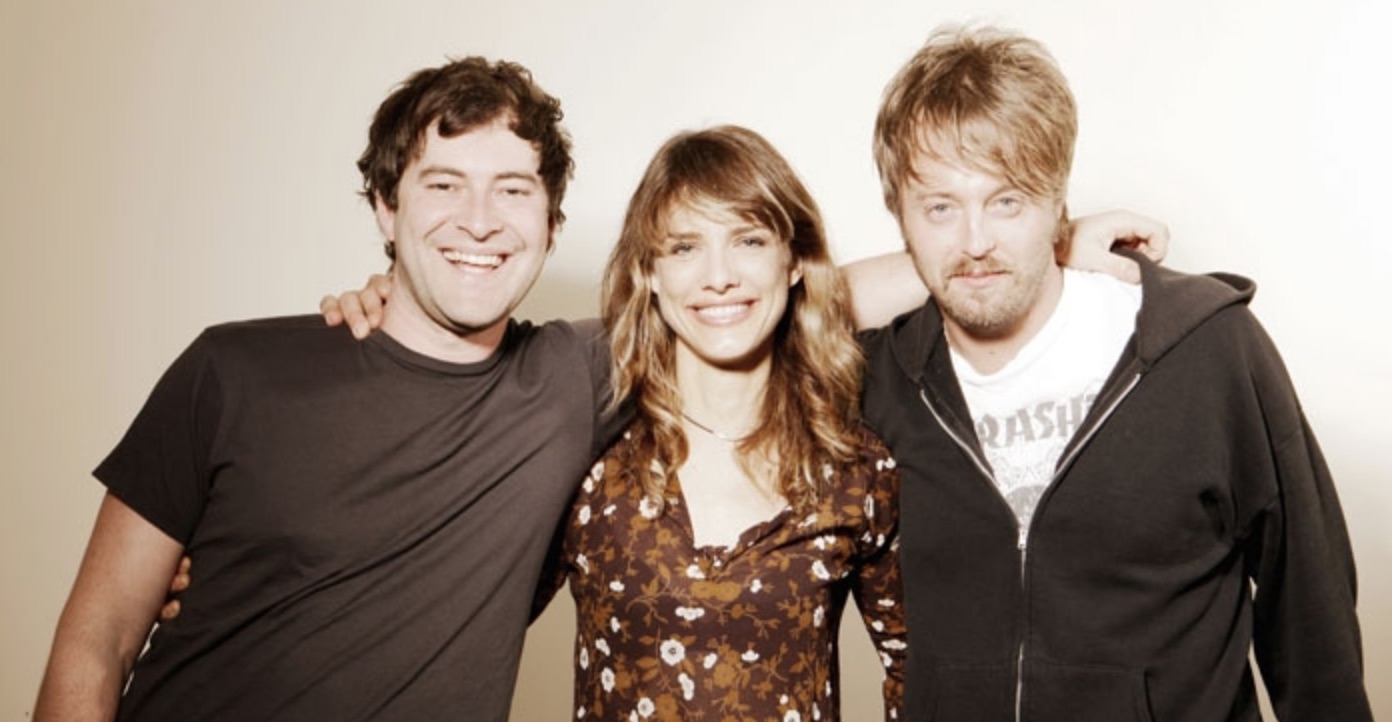 Her third feature, Humpday (2009), would prove her breakout festival hit. Labelled by the British Film Institute as, “a fiercely astute, frequently hilarious riff on the ‘bromantic’ comedy sub-genre”, it starred fellow mumblecore figurehead Mark Duplass and Joshua Leonard (pictured, right; with Shelton) as straight friends coerced into a ‘homosexual art project’. A Sundance Jury Prize winner and National Board of Review Top Independent Film honoree, Humpday paved the way for Shelton’s distinctive and adored feature film output, which included Your Sister’s Sister (2011), Touchy Feely (2013), Laggies (2014), Outside In (2017) and Sword of Trust (2019).
Her third feature, Humpday (2009), would prove her breakout festival hit. Labelled by the British Film Institute as, “a fiercely astute, frequently hilarious riff on the ‘bromantic’ comedy sub-genre”, it starred fellow mumblecore figurehead Mark Duplass and Joshua Leonard (pictured, right; with Shelton) as straight friends coerced into a ‘homosexual art project’. A Sundance Jury Prize winner and National Board of Review Top Independent Film honoree, Humpday paved the way for Shelton’s distinctive and adored feature film output, which included Your Sister’s Sister (2011), Touchy Feely (2013), Laggies (2014), Outside In (2017) and Sword of Trust (2019).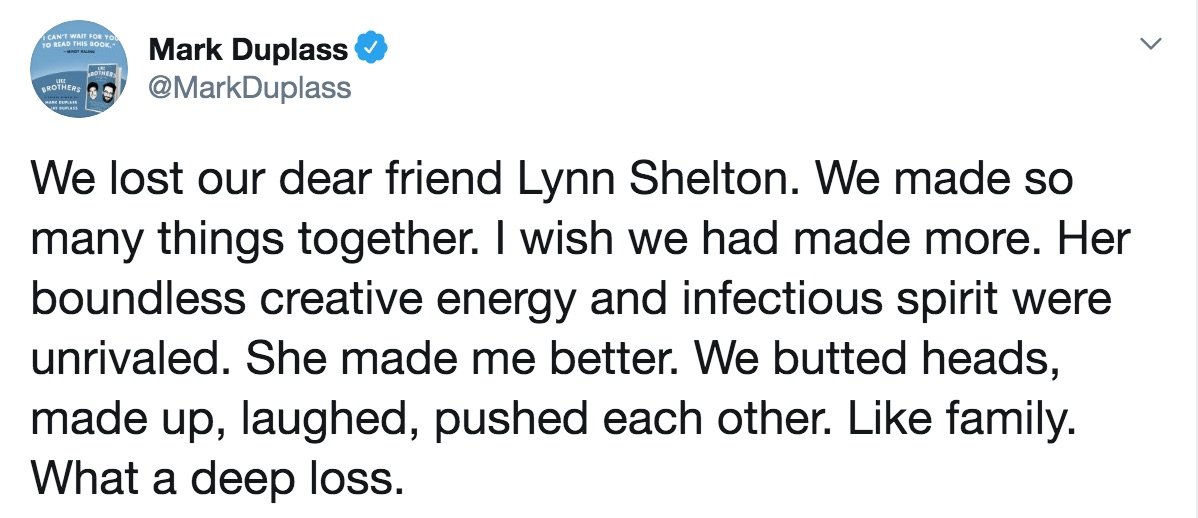
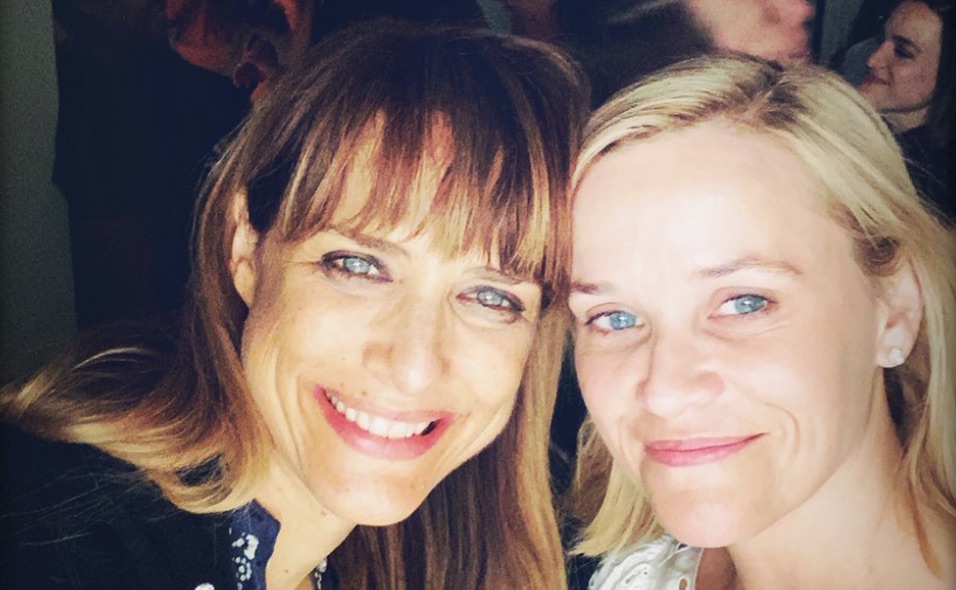 Between feature films, Lynn Shelton made some of the most critically acclaimed television hours of the last decade. Her unmistakable energy and honesty enlivened episodes of Mad Men, New Girl, The Mindy Project, The Good Place, Santa Clarita Diet, Shameless, Touchy Feely, Dickinson and Fresh Off the Boat. Most recently, she directed Reese Witherspoon (pictured, right; with her director) and Kerry Washington in four episodes of Little Fires Everywhere, streaming service Hulu’s acclaimed adaptation of Celeste Ng's 2017 bestselling book. Witherspoon, who also worked with Shelton on the Apple TV series The Morning Show, took to her social profile on Twitter to express her sadness…
Between feature films, Lynn Shelton made some of the most critically acclaimed television hours of the last decade. Her unmistakable energy and honesty enlivened episodes of Mad Men, New Girl, The Mindy Project, The Good Place, Santa Clarita Diet, Shameless, Touchy Feely, Dickinson and Fresh Off the Boat. Most recently, she directed Reese Witherspoon (pictured, right; with her director) and Kerry Washington in four episodes of Little Fires Everywhere, streaming service Hulu’s acclaimed adaptation of Celeste Ng's 2017 bestselling book. Witherspoon, who also worked with Shelton on the Apple TV series The Morning Show, took to her social profile on Twitter to express her sadness…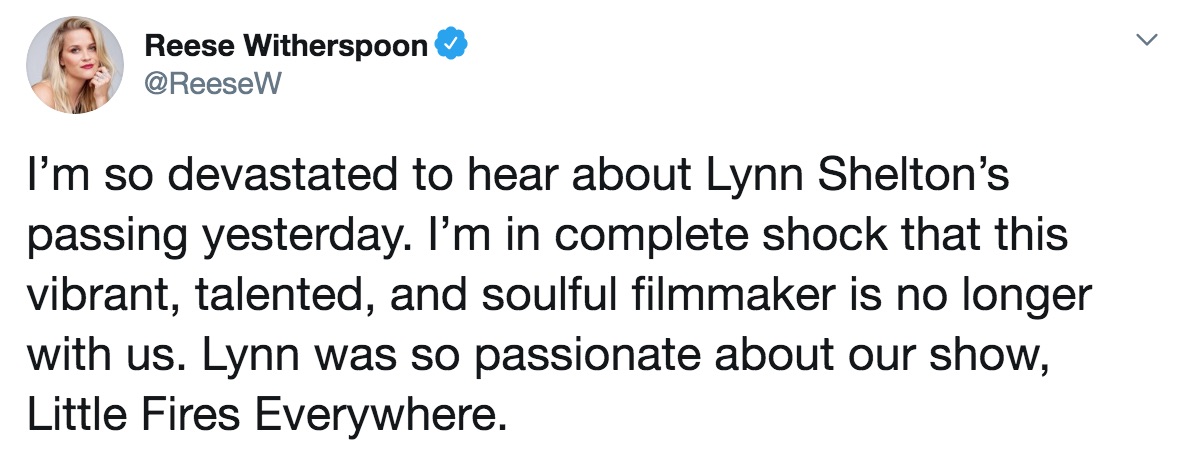
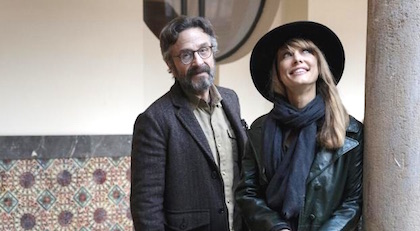 Maron addressed her shock passing in a public statement that read, in part, “I loved her very much as I know many of you did as well. It’s devastating. I am leveled, heartbroken and in complete shock and don’t really know how to move forward in this moment. She was a beautiful, kind, loving, charismatic artist. Her spirit was pure joy. She made me happy. I made her happy. We were happy. I made her laugh all the time. We laughed a lot. We were starting a life together. I really can’t believe what is happening. This is a horrendous, sad loss.”
Maron addressed her shock passing in a public statement that read, in part, “I loved her very much as I know many of you did as well. It’s devastating. I am leveled, heartbroken and in complete shock and don’t really know how to move forward in this moment. She was a beautiful, kind, loving, charismatic artist. Her spirit was pure joy. She made me happy. I made her happy. We were happy. I made her laugh all the time. We laughed a lot. We were starting a life together. I really can’t believe what is happening. This is a horrendous, sad loss.”
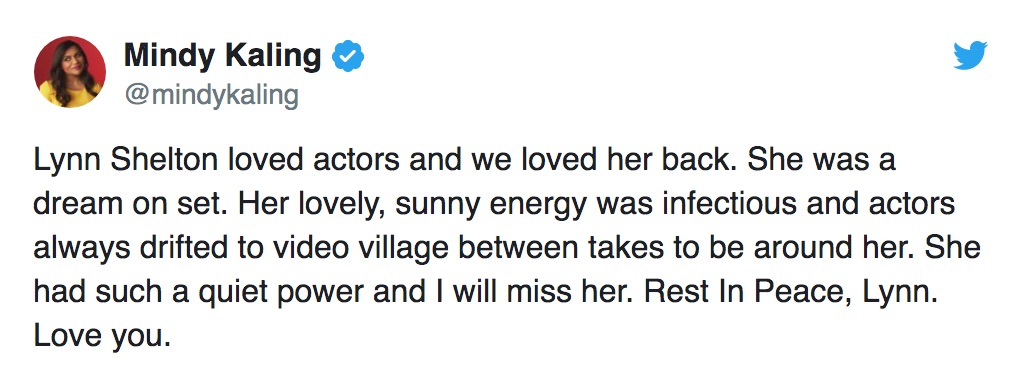


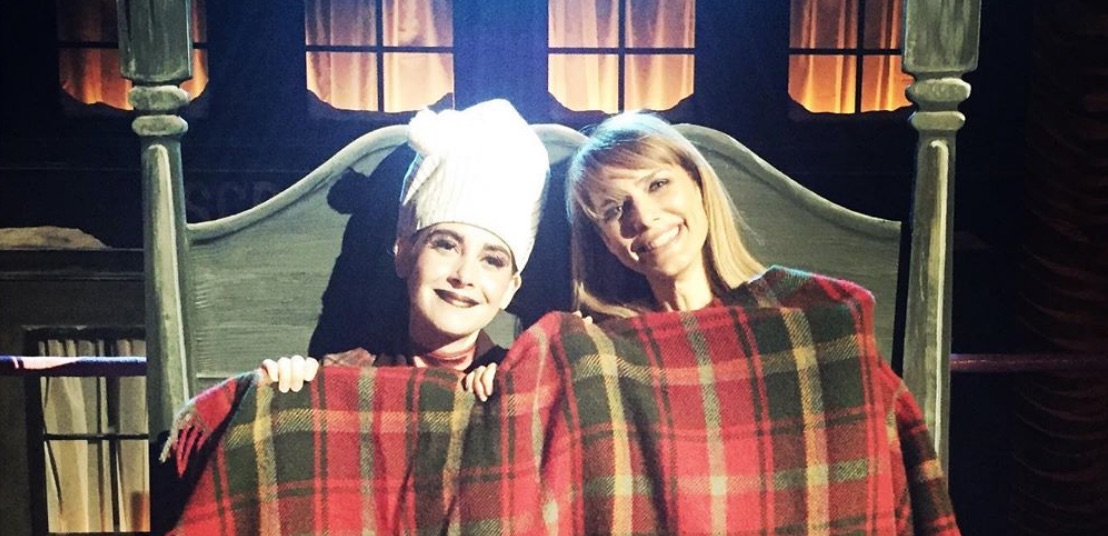
 Hollywood,
Hollywood,  Independent Film,
Independent Film,  Obituary,
Obituary,  Television
Television 








